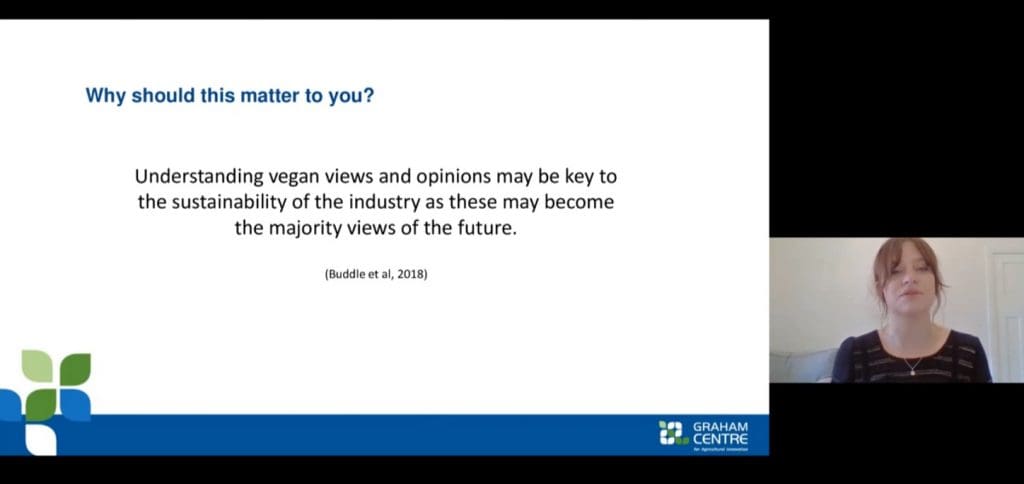

Charles Sturt University Bachelor of Animal Science (Honours) student Erin Stranks
UNDERSTANDING the shared animal welfare values of livestock producers and vegans could be the solution to industry sustainability, a Charles Sturt University researcher proposed today.
At the Charles Sturt University’s Graham Centre for Agricultural Innovation online forum, Bachelor of Animal Science Honours student Erin Stranks said she believed there are values shared by both groups.
She also believed that positive and productive conversations can be facilitated between the groups “for change and innovation.”
Ms Stranks is researching the issue and is conducting an online survey to quantify the values of livestock producers and vegans on issues around animal welfare, food production and consumption.
She said the research through the Graham Centre for Agricultural Innovation aims to learn more about opinions on the ethics and future of meat production in Australia.
“I can already see an overlap in animal welfare concern, a want for progress and innovation, lessening environmental impacts and minimising suffering for animals.”
Ms Stranks said the shared values issue should matter to livestock producers because of the changes in consumer markets. There was also increased scrutiny of animal welfare, radical protests by activists on farms and abattoirs, and veganism gaining social licence and influence globally, she said.
“A 2019 Food Frontier report on meat consumption has shown that one-in-10 Australians are reducing their meat intake, with baby boomers aged 56 to 76 leading a reduction in meat consumption.
“There is also the economic side; economically the plant-based industry in Australia grossed $150 million last year and is expected to increase to $3 billion by 2020.
“In comparison the livestock industry grossed approximately $66 billion and provided employment for 400,000 people,” she said.
“So while the plant-based industry has less of an economic significance than the livestock industry, it does show an increase in monetary value awarded to plant-based products by consumers.”
Ms Stranks said livestock producers relied on social licence approval from consumers to operate and her research had shown that involving all stakeholders in conversations around animal welfare can increase social licence.
She said a study into meat consumers and animal welfare activism highlighted that livestock producers’ understanding of vegan views and opinions might be key to the sustainability of the industry, “which is your business.”
“And these might become the majority views of the future.
“So if you are over 18, vegan or a livestock producer, we would love to hear your opinion.”
Ms Stranks said it was important to understand the differences and similarities in beliefs held by vegans and livestock producers, as they can provide insight into consumer preference to see if there’s opportunity for a collaborative approach to animal production in Australia.
“We hope that people who are actively involved in the production of meat, poultry, pork, egg, fleece, and aquaculture in Australia, along with people who are vegan will take part in the survey,” she said.
“We hope that people who are actively involved in the production of meat, poultry, pork, egg, fleece, and aquaculture in Australia, along with people who are vegan will take part in the survey,” she said.
Survey responses are anonymous and the research has been approved by Charles Sturt’s Human Research Ethics Committee. Access the online survey by clicking here.

I think everyone needs to have a better understanding of the holistic way animals can be farmed. We have and grow trees and shrubs, we have lots of different grasses, insects, birds, animals (native and feral) that co-exist with our farmed animals. Not too many croppers and vegetable growers would be happy to promote the variety of life that co-exists on a livestock farm. Large-scale plant crops tend to be monocultures, which is not particularly healthy for the environment.
What a waste of time this article was. All the vegans I have come across plaguing Facebook have called me a murderer, rapist and greedy. They all think meat is murder. You can’t talk or reason with these people. They have lost the ability to see it. They don’t want farmers; they hate us.